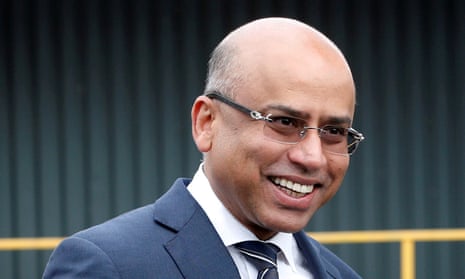Metals magnate Sanjeev Gupta has requested a £170m government bailout to save his conglomerate, owner of Britain’s third biggest steel group, from collapse.
Gupta, the founder of Liberty Steel and its sprawling holding company GFG Alliance, sent a letter to government officials late this week to request the cash. The firm has been strugglingin the face of the pandemic, with cashflow problems compounded by the collapse of its main financier Greensill Capital, which fell into administration earlier this month.
Liberty was forced to pause production at some of its UK plants earlier this month to conserve money. GFG Alliance employs about 5,000 people in the UK and was one of Greensill’s largest borrowers, owing the firm an estimated £3.6bn, according to the Financial Times. Greensill specialised in loans meant to help large businesses pay their suppliers.
Business secretary Kwasi Kwarteng has met with Liberty Steel several times in recent days as a result of the company’s financial crunch. However, he is understood to have concerns about the opaque structure of Gupta’s GFG Alliance and its governance.
If the bailout is approved, ministers are expected to demand reassurances that any taxpayer funds used to support the company would stay in the UK and protect British jobs, rather than being siphoned off into other parts of the business.
GFG Alliance has operations in 30 countries and employs about 35,000 staff.
A government spokesperson said: “The government is closely monitoring developments around Liberty Steel and continues to engage closely with the company, the broader UK steel industry and trade unions.
“The government has supported the steel sector extensively, including providing over £500m in recent years to help with the costs of energy. Our unprecedented package of Covid support is still available to the sector to protect jobs and ensure that producers have the right support during this challenging time.”
GFG is understood to have hired Alvarez & Marsal and PJT Partners to advise on efforts to identify new sources of funding. GFG Alliance declined to comment.
A public bailout for Gupta’s conglomerate is likely to be contentious.
The Guardian revealed on Friday that Greensill has been under investigation at the British Business Bank (BBB) for months over the loans it extended to GFG Alliance through government-backed Covid schemes.
A source confirmed the BBB’s investigation began in the autumn, shortly after it had approved Greensill as an accredited lender able to hand out emergency Covid loans to struggling firms in June.
The revelation suggests officials were raising red flags internally about Greensill’s lending practices months before its financial troubles started making national headlines in early March.
The close relationship between Gupta and Greensill have also been cited as the reason financial backers withdrew support for the supply chain finance firm earlier this month. Switzerland’s GAM Holding and Credit Suisse, which raised money to finance Greensill loans from their customers, said they were uneasy about the firm’s management and the growing pile of advances issued to GFG Alliance.
However, the government bailout is likely to find support among unions and opposition leaders.
Unions representing the steelworkers recently asked the government to give assurances that it will step in to save production if a funding deal falls through
Meanwhile, the shadow minister for business and consumers Lucy Powell said it was important to protect UK jobs. “Labour has called for a plan B for Liberty Steel,” she said.
“It’s in our national interest to safeguard jobs and domestic steel-making capacity. The ball is now in the government’s court. Ministers must put aside ideology and keep all options on the table, to ensure the best value for money option and the long-term future of these plants.”
